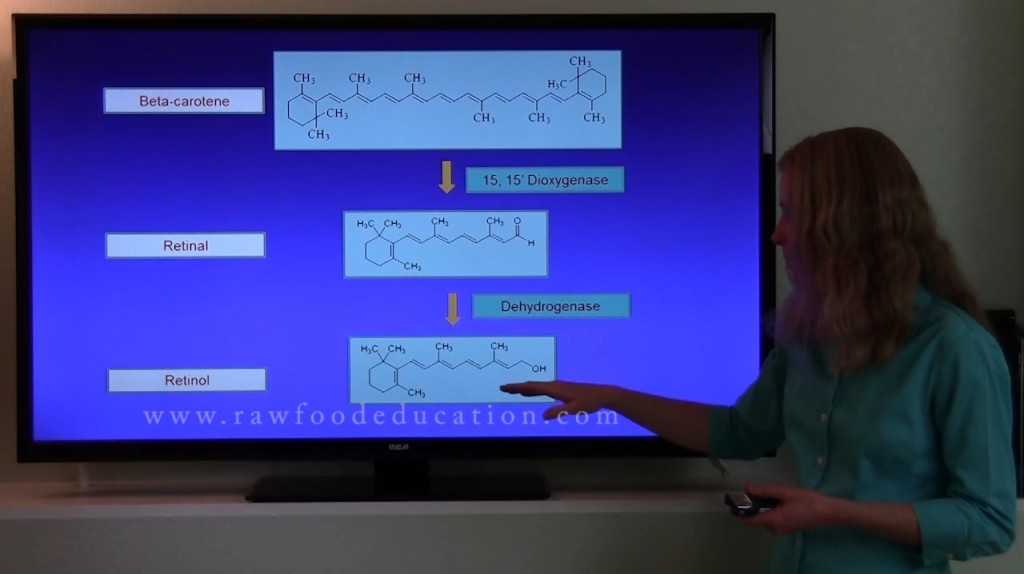 Where does one get vitamin A on a plant-based vegan diet?
Where does one get vitamin A on a plant-based vegan diet?
Vitamin A is essential for proper cell growth and reproduction and is probably best known for its importance in vision. It also plays an important role in immune system function and skin health. Vitamin A (also known as retinol) is found exclusively in animal foods and various vitamin supplements. Vitamin A is an essential nutrient for humans, so if one is eating a vegan diet, where is this vitamin A obtained? Fortunately, the human body converts beta-carotene and certain other carotenoids to vitamin A when necessary. Beta-carotene is a well-known carotenoid famous for providing carrots with their orange coloring and is found in many other plant foods, especially green, yellow, and orange-colored fruits and vegetables.
Beta-carotene conversion to vitamin A
How does this conversion of beta-carotene to vitamin A work? In the human body, beta-carotene is converted to retinal by a dioxygenase enzyme. Retinal is then converted to retinol (vitamin A) by a dehydrogenase enzyme:
Other carotenoids that are capable of converting to vitamin A in the human body include alpha-carotene, gamma-carotene, and beta-cryptoxanthin. Of the four carotenoids, the one that converts the most reliably to vitamin A is beta-carotene.
Why is my skin orange?
Vitamin A is a fat-soluble nutrient, which means that it can be stored in our body and we run the risk of getting too much from outside sources, such as supplements consumed in excess of the body’s needs. Carotenoids are fat soluble also, but do not carry the same risks as vitamin A with excess consumption. In excess of the body’s needs, carotenoids are stored in fat cells including those under our skin, giving an orange color to the skin which is only cosmetic.
Do we have to cook our food to get enough beta-carotene and vitamin A?
Many people have asked about the effectiveness of this carotenoid conversion mechanism and how well carotenoids are absorbed from raw food. A recent study found normal vitamin A status and favorable blood beta-carotene levels in 200 long-term raw food enthusiasts. This indicates is that these raw foodists consumed a good amount of beta-carotene, a quantity was absorbed and was present in their bloodstream, and then an appropriate amount was converted into vitamin A.
References:
Fleshman, Matthew Kintz. Beta Carotene Absorption and Metabolism. Ph.D. dissertation, Ohio State University, 2011.
Garcia A, Koebnick C, Dagnelie P, Strassner C, Elmadfa I, Katz N, Leitzmann C, Hoffman I. British Journal of Nutrition 2008; 99: 1293 – 1300.
Interested in taking your vitamin A, beta-carotene, and general nutrition knowledge to the next level?
We cover this topic and so much more in our online Mastering Raw Food Nutrition and Educator Course. For more class details, click here.
Additionally, our book The Raw Food Nutrition Handbook: An Essential Guide to Understanding Raw Food Diets addresses many hot topics in raw food nutrition such as essential fats, protein, nutrient content of raw food diets, food combining, enzymes, hydration, vitamins, minerals, and many more. We value education on these important topics and are happy to finally bring this book to you. The book is available on Amazon and other online booksellers.
One of the best ways to keep in touch with us is to join our email list. You’ll receive a free copy of Our Top 12 Strategies for Long Term Success on A Raw Plant-Based Diet eBook along with regular information about raw food and plant-based diets and periodic promotions for our classes, events, and other offerings!

